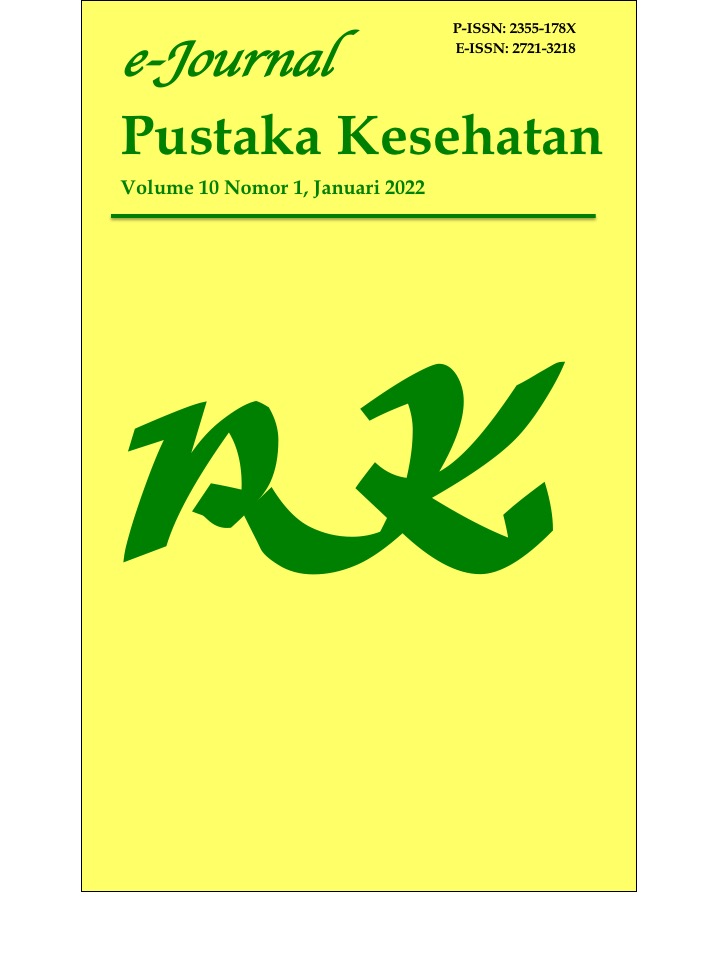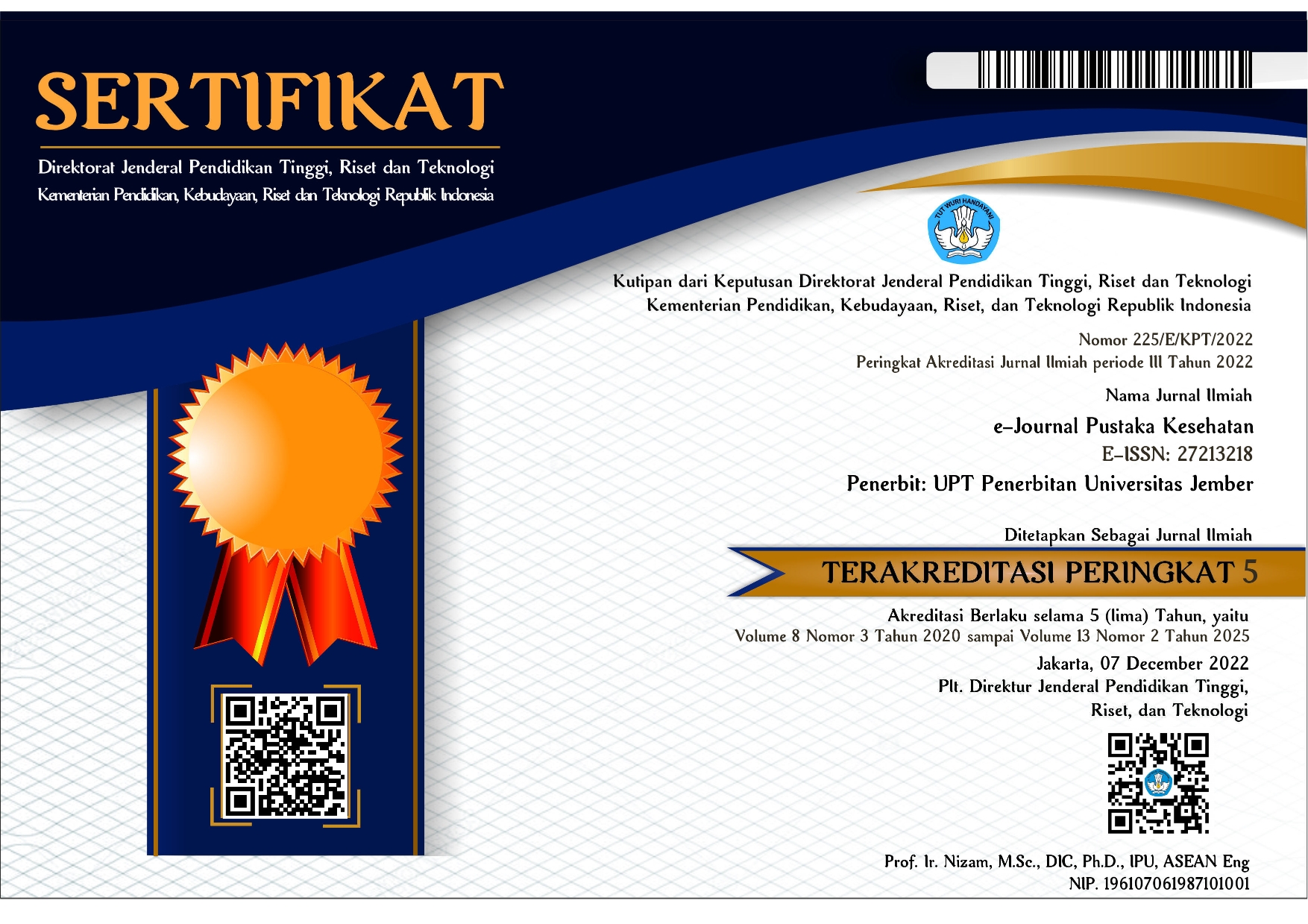Hubungan Ketakutan akan Hipoglikemia dengan Manajemen Diri Pasien Diabetes Melitus Tipe 2 di RSD dr. Soebandi Jember
DOI:
https://doi.org/10.19184/pk.v10i1.11326Keywords:
Type 2 Diabetes Mellitus, Fear of Hypoglycemia, Diabetes Self ManagementAbstract
Hypoglycemia is a complication of diabetes that causes unpleasant symptoms and fear for recurrence. This fear can influence diabetes management and patient metabolic control. The study aimed to analyze the relationship between fear of hypoglycemia and self-management of type 2 DM patients at dr. Soebandi Jember general hospital. The fear of hypoglycemia variable was measured using the Fear of Hypoglycemia Scale questionnaire (FH-15) and the variable of diabetes self-management was measured by the Diabetes Self-Management Questionnaire (DSMQ). The sample was 84 respondents that recruited using consecutive sampling method. Data was analyzed using the Spearman correlation test with α = 0.05. The results showed that patients did not experience fear of hypoglycemia (78.6%) and self-management of diabetic patients showed a good category (77.4%). There is a significant and positive correlation between the two variables (p-value = 0.012 and r = 0.272) which means that the more fearful the patient the more self-management gets worse, and conversely the less afraid of the patient the better self-management of diabetes. Family involvement is support for patients in controlling their fears, recognizing signs of hypoglycemia and as a reminder in managing proper diabetes. Diet control is an indicator of diabetes management that must be considered for patients to improve their health status by optimizing nutrition to prevent recurrent hypoglycemia.
Downloads
References
[2] Ahola AJ, Saraheimo M, Freese R, Mäkimattila S, Forsblom C, Groop PH. Fear of hypoglycaemia and self-management in type 1 diabetes. J Clin Transl Endocrinol [Internet]. 2016;4:13–8. Available from: http://dx.doi.org/10.1016/j.jcte.2016.02.002
[3] American Diabetes Association (ADA). Standards of medical care in diabetes. Clin Appl Res Educ. 2017;40(January).
[4] Kemenkes RI. Situasi dan analisis diabetes. Pusat Data dan Informasi. 2014.
[5] Anderbro TC, Amsberg S, Moberg E, Ulf LG, Lins AP. A longitudinal study of fear of hypoglycaemia in adults with type 1 diabetes. Endocrinol Diabetes Metab. 2018;(July 2017):1–5.
[6] Haluzik M, Kretowski A, Strojek K, Czupryniak L, Janez A, Kempler P, et al. Perspectives of patients with insulin-treated type 1 and type 2 diabetes on hypoglycemia : results of the hat observational study in central and eastern european countries. Diabetes Ther. 2018;9(2):727–41.
[7] Zammitt NN, Frier BM. Hypoglycemia in type 2 diabetes. 2005;28(12).
[8] Mulyani NS. Hubungan self management pasien diabetes mellitus tipe II dengan kadar gula darah di rumah sakit kota banda aceh. 2016;3(2):56–63.
[9] Zainuddin M, Utomo W, Herlina. Hubungan stres dengan kualitas hidup penderita diabetes melitus tipe 2. 2015;2(1):890–8.
[10] Trisnawati SK, Setyorogo S. Faktor risiko kejadian diabetes melitus tipe II di puskesmas kecamatan cengkareng jakarta barat tahun 2012. J imiah Kesehat. 2013;5(1):6–11.
[11] Puspitasari F. Gambaran tingkat pengetahuan dan sikap tentang monitoring kadar gula darah mandiri pada penderita dm di rs pku muhammadiyah yogyakarta. 2014;
[12] Ramadona A. Pengaruh konseling obat terhadap kepatuhan pasien diabetes melitus tipe 2 di poliklinik khusus rumah sakit umum pusat dr. m.djamil Padang. 2011;
[13] Salistyaningsih W, Puspitawati T, Nugroho DK. Hubungan tingkat kepatuhan minum obat hipoglikemik oral dengan kadar glukosa darah pada pasien diabetes melitus tipe 2. Ber Kedokt Masy. 2011;27(4):215–21.
[14] Miller CD, Phillips LS, Ziemer DC, Gallina DL, Cook CB, El-Kebbi IM. Hypoglycemia in patients with type 2 diabetes mellitus. 2001;161.
[15] Irawan D. Prevalensi dan faktor risiko kejadian diabetes melitus tipe 2 di daerah urban indonesia (analisa data sekunder riskesdas 2007). 2010;
[16] Lestari DD, Purwanto DS, Kaligis SHM. Gambaran kadar glukosa darah puasa pada mahasiswa angkatan 2011 fakultas kedokteran universitas sam ratulangi dengan indeks massa tubuh 18,5-22,9kg/m 2. J e-Biomedik. 2013;1:991–6.
[17] Mongisidi G. Hubungan antara status sosio-ekonomi dengan kejadian diabetes melitus tipe 2 di poliklinik interna blu rsup prof. dr. r.d.kandou manado. 2014;
[18] Amir SMJ, Wungouw H, Pangemanan D. Kadar glukosa darah sewaktu pada pasien diabetes melitus tipe 2 di puskesmas bahu kota manado. J e-Biomedik. 2015;3(April).
[19] Wicaksono RP. Faktor-faktor yang berhubungan dengan kejadian diabetes melitus tipe 2. 2011;2.
[20] Hasdianah. Mengenal diabetes melitus pada orang dewasa dan anak-anak dengan solusi herbal. Yogyakarta: Nuha Medika; 2012.
[21] Smeltzer SC, Bare BG, Hinkle JL, Cheever KH. Brunner & suddarth’s textbook of medical-surgical nursing. 12th ed. Surrena H, editor. China: Wolters Kluwer / Lippincott Williams & Wilkins; 2010.
[22] Stargardt T, Gonder-frederick L, Krobot KJ, Alexander CM. Fear of hypoglycaemia : defining a minimum clinically important difference in patients with type 2 diabetes. Biomed Cent. 2009;8:1–8.
[23] Marrett E, Radican L, Davies MJ, Zhang Q. Assessment of severity and frequency of self- reported hypoglycemia on quality of life in patients with type 2 diabetes treated with oral antihyperglycemic agents : a survey study. BMC Res Note. 2011;4.
[24] Rahayu E, Kamaluddin R, Sumarwati M. Pengaruh program diabetes self management education berbasis keluarga terhadap kualitas hidup penderita diabetes melitus tipe II di wilayah puskesmas II baturaden. Keperawatan Soedirman. 2014;9(3).
[25] Erol O, Enc N. Hypoglycemia fear and self-efficacy of turkish patients receiving insulin therapy. Asian Nurs Res (Korean Soc Nurs Sci) [Internet]. 2011;5(4):222–8. Available from: http://dx.doi.org/10.1016/j.anr.2011.12.001
[26] Sakane N, Kotani K, Tsuzaki K, Nishi M, Takahashi K, Murata T, et al. Fear of hypoglycemia and its determinants in insulin-treated patients with type 2 diabetes mellitus. J Diabetes Investig. 2015;6(5):567–70.
[27] Kalra S, Mukherjee JJ, Venkataram S, Bantwal G, Shaikh S, Saboo B, et al. Hypoglycemia : the neglected complication. Indian J Endocrinol Metab. 2013;17(5).
[28] Tenzer-iglesias P, Shannon MH. Managing hypoglycemia in primary care. J Fam Pract. 2012;61(10):1–8.
[29] Huang M, Zhao R, Li S, Jiang X. Self-management behavior in patients with type 2 diabetes : a cross-sectional survey in western urban. PLoS One. 2014;9(4).
[30] Shrivastava SR, Shrivastava PS, Ramasamy J. Role of self-care in management of diabetes mellitus. Diabetes Metab Disord. 2013;1–5.
[31] Laili NR, Dewi YS, Widyawati IY. Edukasi dengan pendekatan prinsip diabetes self management education (dsme) meningkatkan perilaku kepatuhan diet pada penderita diabetes mellitus tipe 2. 2012;
[32] Sam N, Lestari H, Afa JR. Analisis hubungan activity of daily living (adl), aktivitas fisik dan kepatuhan diet terhadap kadar gula darah pasien diabetes melitus di wilayah kerja puskesmas poasia tahun 2017. J Ilm Kesehat Masy. 2017;2(7):1–12.
[33] Hagan CO, Vito G De, Boreham CAG. Exercise prescription in the treatment of type 2 diabetes mellitus : current practices , existing guidelines and future directions. Sport Med. 2013;39–49.
[34] Murphy K, Chuma T, Mathews C, Steyn K, Levitt N. A qualitative study of the experiences of care and motivation for effective self-management among diabetic and hypertensive patients attending public sector primary health care services in south africa. BMC Health Serv Res [Internet]. 2015;15(1):1–9. Available from: http://dx.doi.org/10.1186/s12913-015-0969-y
[35] Javanbakht M, Abolhasani F, Mashayekhi A, Baradaran HR, Jahangiri Y. Health related quality of life in patients with type 2 diabetes mellitus in iran : a national survey. PLoS One. 2012;7(8):1–9.
[36] Fidler C, Christensen TE, Gillard S. Hypoglycemia : an overview of fear of hypoglycemia, quality of life, and impact on costs. Med Econ. 2011;14(5):646–55.
[37] Brito-Sanfiel M, Diago-Cabezudo J, Caldero A. Economic impact of hypoglycemia on healthcare in spain. 2010;
[38] Barendse S, Singh H, Frier BM, Speight J. The impact of hypoglycaemia on quality of life and related patient-reported outcomes in type 2 diabetes : a narative review. Diabet Med. 2012;293–302.
[39] Ahola AJ, Groop P. Barriers to self-management of diabetes. Diabet Med. 2012;413–20.
[40] Powers MA, Bardsley J, Cypress M, Duker CP, Funnell MM, Fischl AH, et al. Diabetes self-management education and support in type 2 diabetes. Diabetes Educ [Internet]. 2017;43(1):40–53. Available from: http://journals.sagepub.com/doi/10.1177/0145721716689694
Downloads
Published
Issue
Section
License
e-Journal Pustaka Kesehatan has CC-BY-SA or an equivalent license as the optimal license for the publication, distribution, use, and reuse of scholarly work. Authors who publish with this journal retain copyright and grant the journal right of first publication with the work simultaneously licensed under a Creative Commons Attribution-ShareAlike 4.0 International License that allows others to share the work with an acknowledgment of the work's authorship and initial publication in this journal.







